Around these parts, we are kind of high on Star Trek: Enterprise at the moment. After writing about my picks for the top 10 Enterprise episodes, I have been binge re-watching the show. Meanwhile, fellow WeMinoredInFilm writer Julianne is currently at DragonCon in Atlanta, Georgia where she informs me she met Dominic Keating, Malcolm from Enterprise. He even remembered her name when he saw her the next day. The next day! So, it is of special interest to us that according to multiple websites (PopMatters, AICN, io9) the newly released blu-ray season sets for Enterprise reveal some fascinating behind the scenes details about the differences between what the show’s creators wanted to do and what the studio made them do.
Let’s set the table first. Enterprise, of course, is the Star Trek prequel series which aired for 4 seasons on the now defunct UPN from 2001-2005. It is often mocked or merely thought poorly of by fans due to its overly convoluted over-arching time travel plot (i.e., the temporal cold war), horrendous theme song (a re-purposed, re-recorded version of the Dianne Warren-penned, Rod Stewart-sung “Faith of the Heart” from Patch Adams), overly obvious objectification of voluptuous cast member Jolene Blalock, lack of dynamic central characters, and a series finale which basically apologized for the whole show. However, around here we are staunch Enterprise-defenders, especially of the third and fourth seasons. After all, that schmaltzy theme song is easily skippable via the fast-forward button. The second season blu-ray set features a 78-minute roundtable discussion with series co-creator Brannon Braga and all 7 series regulars. Plus, there are three additional features, each of them a half-hour in length, which features the writers and stars discussing the second season as well as the show in general.
Surprise, surprise, they mostly blame the network (UPN) and studio (Paramount) for everything that went wrong. Plus, it’s made fairly obvious that their experience together on Enterprise fractured the working relationship between show co-creators and long-time Star Trek producers Brannon Braga and Rick Berman. It should be noted that no one from UPN and Paramount are present in any of the features to defend themselves, and Berman is only present in two of the half-hour specials meaning he’s also not always around to defend himself either. But as mostly one-sided stories go there are some interesting revelations here, among the most intriguing being:
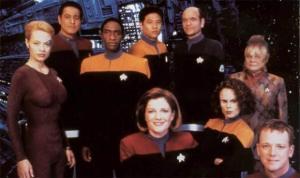
It’s not you, Voyager, it’s us; we needed to go on “a break” after being with you for 7 years….well, maybe you’re partially responsible.
- Berman originally wanted to keep Star Trek off the air after Voyager for a couple of years before starting a new show. Paramount disagreed and would move on without him if he didn’t step in line. The argument for Star Trek having been better served at the time by taking a break from television for a couple of years is a seemingly common one among fans now. Scott Bakula supports the argument during the roundtable discussion..
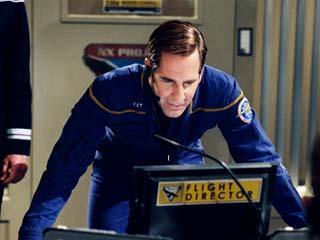
Would you have been cool with an entire season like the season 2 episode “First Flight”?
- Remember the season 2 episode “First Flight” in which we see the background of how Captain Archer came to be the captain of the Enterprise? In the initial pitch, that’s what Berman and Braga wanted to occupy the entire storyline of an Earth-bound first season focused on watching our future captain and crew members build toward making the scientific advances necessary for the Enterprise to even exist while the Vulcans fought to limit their progress.
- Berman and Braga fired most of the entire writing staff after the first season.
- The writers wanted to expand the show’s horizons and not just do standard Star Trek stories. They were itching to kill characters off to heighten dramatic stakes and do serialized stories. However, the studio vehemently disagreed. They wanted Enterprise to basically be more of the same, and actually operate under a studio mandate that all episodes reach a narrative conclusion that could allow the next week’s episode to be viewed with no difficulty if having missed the prior episode.
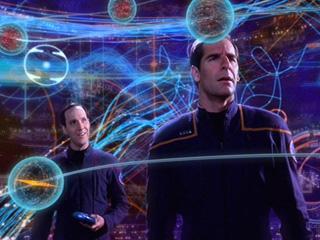
Scott Bakula says fans still ask him what the heck was going on with that temporal cold war storyline.
- With that in mind, rather bizarrely the most serialized element of the first two seasons, the temporal cold war storyline, was actually a studio mandate. Why? It was a way of both doing a straight-ahead prequel and not a prequel. Simply building toward the creation of the Federation and establishing how the bridge from Archer to Kirk was built made studio executives nervous. The cold war storyline was a way of presenting a considerable risk that everything that had happened in the prior Star Trek shows could potentially be undone by an over-arching, time-altering storyline. However, all involved parties on the creative side seem to agree that the storyline got away from them.
- UPN experienced heavy turnover in its executive ranks in-between Enterprise’s first and second seasons, and the new bosses had some incredibly bizarre requests. The most headline-grabbing request is that one such executive suggested that the Enterprise take a new boy band on ship every week, and that boy band would perform a song.
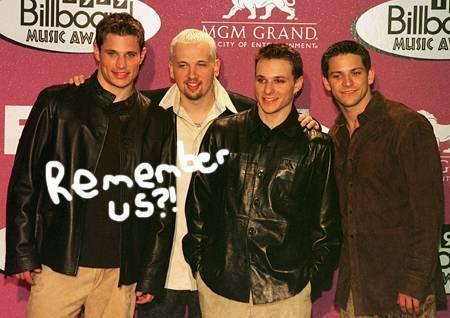
Random boy band example: 98 Degrees. So, would they have been themselves, or made up in some alien make-up? How would this have even worked?
- According to Braga, Viacom CEO Jonathan Dolgen, the corporate overlord of Paramount and UPN, loosened the storyline restrictions on the show, allowing them “to shake things up” in-between seasons 2 and 3. This was done presumably because Dolgen was a huge Star Trek fan unhappy with Enterprise not as a business venture but as a fan of the intellectual property.
- The basic Xindi storyline begun in the season 2 finale “The Expanse” was conceived of by Berman and Braga on their own without the assistance of the show’s writers.
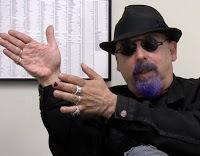
Ira Steven Behr.
- Deep Space Nine head writer/producer and just general badass Ira Steven Behr was invited to the production offices as a way of secretly offering him a senior level position on the show. Instead, Behr proceeded to verbally shit on the show in a way Braga had never heard nor experienced. One imagines Behr holding out a microphone in front of him and dropping it to the ground as a visual exclamation of how much he just owned Braga to the extent that there was no response possible thus no need for a microphone.
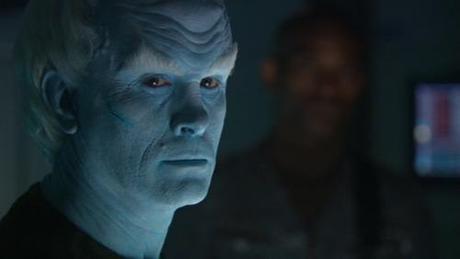
We could have had Shran calling Archer “pink-skin” on a weekly basis if a fifth season had happened.
- Jeffrey Comb’s Andorian Commander Shran was going to made a series regular in the fifth season.
- Fan dissatisfaction was such that people began hate-watching the show (a phenomenon the writers/actors would have been fine seeing more of because it would have meant higher ratings), and one fan even sent a cardboard box full of trash to the production office with a note which rather simply explained how this (trash) is what they had turned Star Trek into.
You can read about even more revelations, such as which episodes Braga, Bakula, and others liked the most and which ones they’d rather forget over at AintItCoolNews.
It is impressive that previously fan convention-specific revelations such as those listed above have made their way to officially released Blu-Ray release. Paramount is clearly cool with airing its dirty laundry, and Braga is refreshingly willing to burn bridges, probably because the network he bashes, UPN, is long since gone now. In one of the features, he even voices his hope that Enterprise could some day return. Based upon what they say, the sudden transition from episodic to fiercely serialized storytelling from the first two seasons to the final two seasons of Enterprise makes a whole lot more sense now.
I have to admit, though, that much as I do like that season 2 episode “The First Flight” the concept of an entire Earth-bound season of Star Trek is not something I would have particularly cared to see. The question with doing a Star Trek prequel is how far back to you go? Some might have been cool with them just doing a straight-up sequel series to the beloved film Star Trek: First Contact. However, while Star Trek definitely needed something different after Voyager an Earth-bound season might have been too big a departure. Starfleet was always good for an Earth-bound episode or two set in San Francisco in the prior shows; not an entire season of TV. I can see why the studio execs shot the idea down, and frankly I’m glad they did, much as co-creator Braga now disagrees.
What do you think? Would you have liked to have seen an Earth-bound season? If so, why? Any other revelations catch your fancy? Let us know in the comments section.

